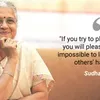World Humanitarian Day: Indian women who led in times of emergency
India has witnessed several women taking the lead in times of emergency, proving that age and gender are purely social constructs. Here’s paying homage to them on World Humanitarian Day.
Martin Luther King once asked, “What are you doing for others?”
And, truly, if you are not helping others in times of difficulty, how else will you pay your good fortune forward. Some of us have had the chance to occasionally help out our friends, family members, and even acquaintances, but how many of us will go the extra mile for strangers?
Turns out, many do.
Since 2008, the United Nations has observed August 19 as the World Humanitarian Day to advocate for safety and security of humanitarian aid workers around the world, whose contributions are often dimmed in the big picture.
And speaking about humanitarians, how can we not remember Mother Teresa who dedicated her life towards working for the poor and needy? The Macedonia-born nun took care of orphans and abandoned children in Kolkata (then Calcutta), and those with leprosy, breaking the stigma associated with the disease.
While announcing this year's theme on World Humanitarian Day, António Guterres, Secretary General for the United Nations, said:
“This year, we pay special tribute to women humanitarians and the huge difference they make for millions of women, men, and children in urgent need. From supporting civilians caught up in crisis to addressing disease outbreaks, women humanitarians are on the frontlines, making aid operations more effective.”

In fact, UNICEF is awarding Indian actor Priyanka Chopra the Danny Kaye Humanitarian Award in December. A global Goodwill Ambassador for Child Rights, Priyanka is known for promoting causes related to environment, health and education, and women's rights.
While celebrities are more visible in the bigger picture, there are many others providing aid on-ground, often risking their lives in times of crisis.
Here’s looking at some women in India who braved the odds and restored our faith in humanity.
Bindu Sathyajith
1566214031148.png?fm=png&auto=format)
Bindu Sathyajith, Founder of Do For Others recently launches website for her other organisation E UNNATHI
Last monsoon, when Kerala was hit by floods, Kochi-based business woman Bindu Sathyajith felt the state desperately needed help, with death tolls rising every day. She started a group called Do for Others (DOF) with her friends - all women - and now has a network of more than 300 people.
The group set up 72 bio toilets in 72 hours in the Kuttanad region and worked with Coast Guard and navy to air-lift people. Working across places like Kochi, Ernakulam, Alappuzha, Munnar, and Thrissur in the state, it set up camps with medical teams from Mysuru, Bengaluru, and Chennai helping with treatment. Her team also provided support to 100 tribal families in Wayanad and Kuttanad.
TV Anupama and K Vasuki
TV Anupama and K Vasuki, district collectors in-charge of Thrissur and Thiruvananthapuram, were lauded on social media for efficiently channelising relief supplies in their respective districts. Anupama updated where the relief materials went timely on Facebook and broke orders and used two rooms inside a civil station for storage.
Gunjan Sarma
1566212037277.png?fm=png&auto=format)
Gunjun Sarma receives award for bravery from Prime Minister Narendra Modi
When a gunman hijacked her school van in December 2013, 14-year-old Gunjan Sarma from Assam, volunteered to be the hostage to save 10 school children. She was a student of Class 8 at the Nazira Central School in Sivasagar district of Assam. The Assam government announced an annual state bravery award in her name, and the first recipient of the award was none other than Gunjan herself.
Sunitha Krishnan

Sunitha Krishnan
Sunitha Krishnan started working for others early at the age of eight, when she was teaching dance to mentally challenged children. A few years later, she started running schools for the underprivileged children in the slum area but was gang-raped at 15.
Undeterred and not someone who gave up, she worked extensively towards rescuing and rehabilitating victims of sex trafficking, and went on to build an NGO called Prajwala in Hyderabad.
In 2016, she received Padma Shri, the fourth highest civilian award in India.
Kiran Bedi
1566212517865.png?fm=png&auto=format)
The first woman IPS officer, Kiran Bedi is known for being honest towards her work.
During her stint as the Inspector General of Prison of the Tihar jail in New Delhi, she introduced a number of reforms like yoga, meditation, and redressal of prisoner’s complaints.
After retiring as an officer, she set up many organisations - the Navjyoti India Foundation, incorporated in 1988, which provides education and skills to the marginalised section of the society, while the India Vision Foundation, incorporated in 1994, focusses on the education of the children of prisoners.
(Edited by Saheli Sen Gupta)






1565950639165.png?fm=png&auto=format&h=100&w=100&crop=entropy&fit=crop)

1565577546722.png?fm=png&auto=format&h=100&w=100&crop=entropy&fit=crop)




